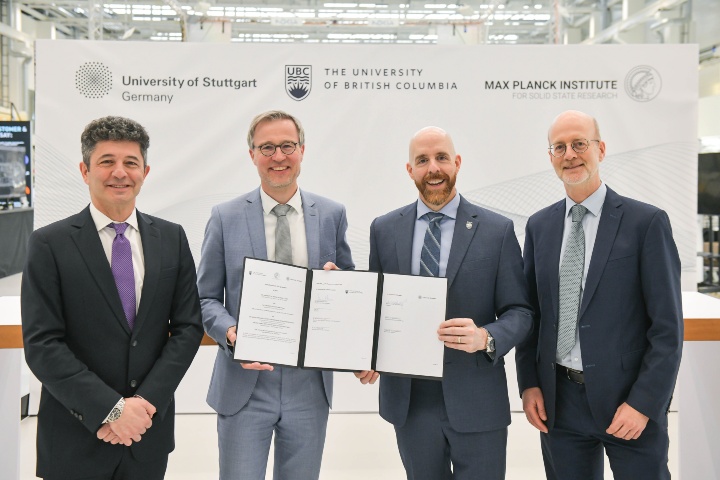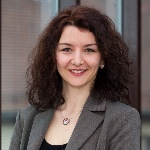Since 2019, the joint PhD program in the field of Quantum Materials has enabled a double doctorate at the University of Stuttgart and the University of British Columbia (UBC). This is made possible by close cooperation between three partners: The University of Stuttgart, UBC´s Stewart Blusson Quantum Matter Institute as well as the Max Planck Institute for Solid State Research (MPI-FKF).

On the occasion of the extension of the program, a signing ceremony took place on January 20, 2025. Prof. Benoit-Antoine Bacon, President of UBC, Prof. Peter Middendorf, Rector of the University of Stuttgart, and Prof. Bernhard Keimer, Director of the MPI-FKF, attended the event.
"This contract extension is truly a reason to celebrate," remarked Rector Peter Middendorf at the event. "The joint PhD program not only fosters the exceptional professional and personal growth of the participating early-career researchers but also represents a vital contribution to scientific progress through successful international collaborations. For the University of Stuttgart, international networking in teaching and research holds strategic importance—such networking thrives on personal exchange. With its forward-thinking research profile and outstanding global reputation, UBC is an especially significant partner for us. We are therefore all the more delighted to welcome such a distinguished delegation from UBC to Stuttgart today as we explore further opportunities for collaboration together."
“UBC and the University of Stuttgart have developed a strong partnership characterized by cutting-edge research collaborations, academic exchanges, joint academic programs, mobility initiatives, and a shared commitment to addressing global challenges. The joint PhD program, led in collaboration with the Max Planck Society, is a cornerstone of our partnership, reflecting a shared commitment to advancing excellence in research, innovation and education,” said UBC President and Vice-Chancellor Prof. Benoit-Antoine Bacon.
“The joint PhD program has allowed us to attract outstanding young scientists to our collaboration,” said Bernhard Keimer, Director of the Max Planck Institute for Solid State Research.
Diverse agenda
The visit by the UBC delegation to the University of Stuttgart and Max Planck Institute for Solid State Research underscores the mutual commitment to expanding linkages in research, teaching and transfer. In addition to the celebrations to mark the extension of the joint PhD program, the event also served to deepen existing collaborations and explore potential new areas of cooperation, such as visualization and simulation, architecture and adaptive building, bionic intelligence, hydrogen technologies, democracy and digital societies, and beyond.
In addition to presentations by researchers from the University of Stuttgart, the program also included a guest lecture by the German Aerospace Center (DLR). The UBC delegation also toured the Max Planck Institute for Solid State Research and the research campus ARENA2036, a world-class research and innovation platform driving advancements in future mobility, lightweight construction, and digital production through interdisciplinary academic and industrial partnerships.
During the visit, the partners also exchanged views on cooperation formats in teaching and research, some of which have been in place for many years. In the area of student mobility, for example, there has been a lively exchange for both student and research stays for years, partly financed with scholarships through 'Erasmus+ KA171 Worldwide'. Joint research projects can be found in a wide range of specialist areas, including in the IntCDC or SimTech clusters of excellence, in aerospace engineering in cooperation with DLR and in the field of hydrogen technologies, to name just a few examples.
Joint PhD program in quantum materials: A valuable asset for early career researchers
Research in quantum materials promises transformative applications in healthcare, computing, defence, advanced sensing, and sustainable energy. The University of Stuttgart with its strategic profile area Quantum Technologies covers the broad spectrum from basic research to the development of technological applications and offers exciting opportunities for young scientists.
With their joint PhD program, the University of Stuttgart, the Max Planck Institute for Solid State Research and the University of British Columbia offer unparalleled opportunities for research training in quantum materials and quantum materials-based devices. The highly collaborative nature of the program exposes graduate students to a wide range of topics in material systems beyond their immediate research projects, positioning them to contribute to the rapidly evolving research frontier and emerging industry.
“Thanks to the program, I can conduct research for my doctoral thesis at more than just one research facility and in more than just one country,” reports participant Cissy Suen. “This gives me access to more laboratories, more knowledge and a larger network.” Suen, who originally comes from Toronto and is currently conducting research in Stuttgart, also finds the program enriching for her personal development: “I am part of a large academic family.”
The renewal of the joint PhD agreement in early 2025 coincides with the United Nations' designation of 2025 as the International Year of Quantum Science and Technology, commemorating a century since the inception of quantum mechanics.

Ora Bukoshi
Scientific Assistant to the Rector




